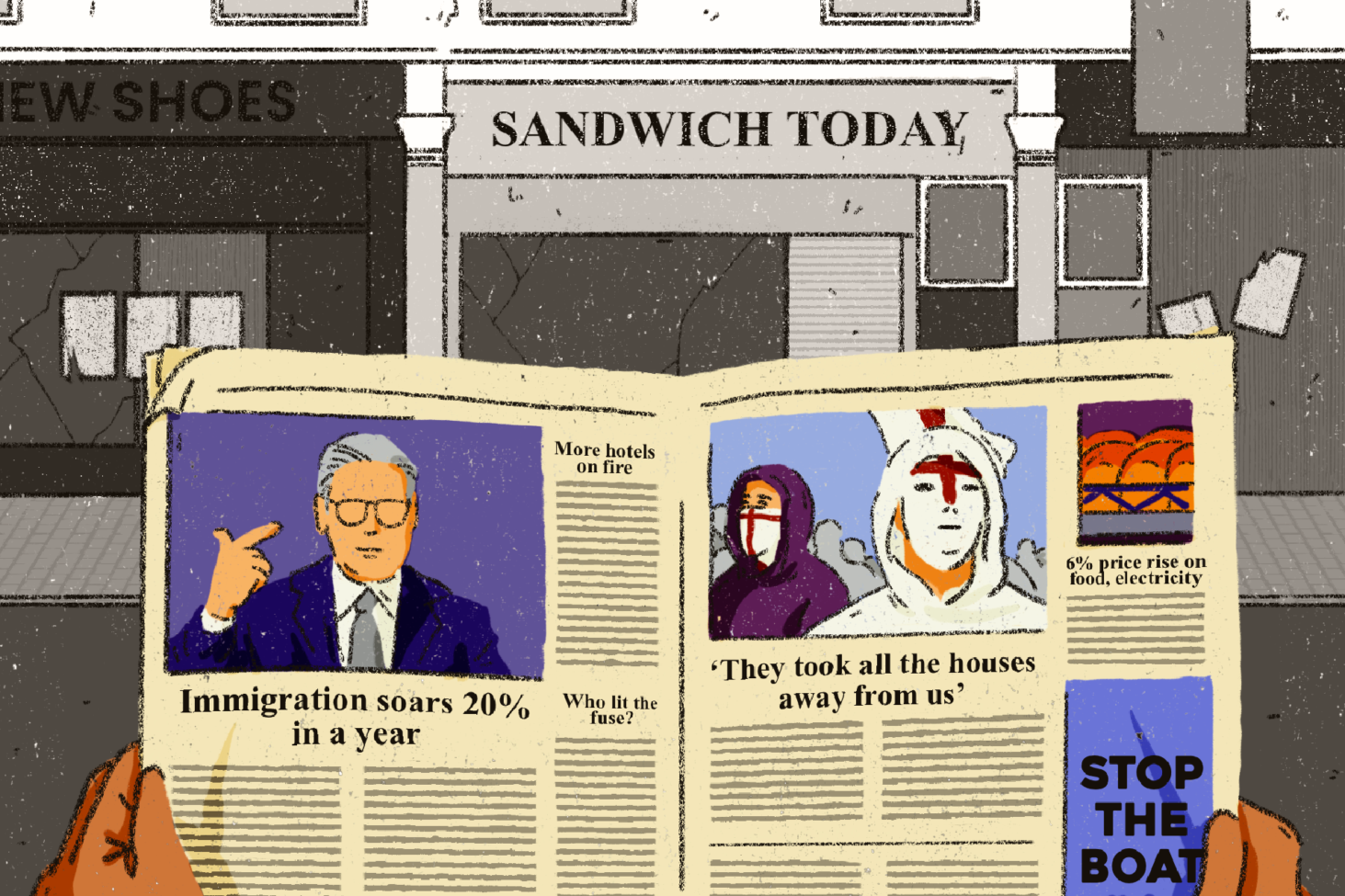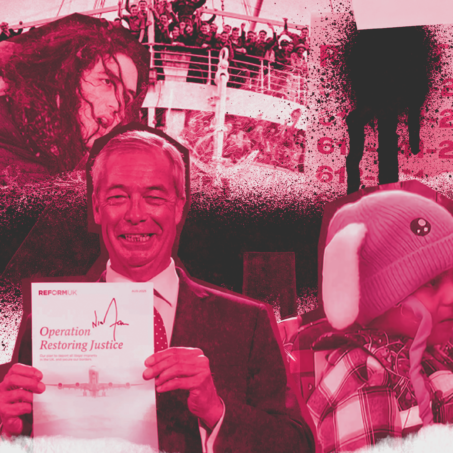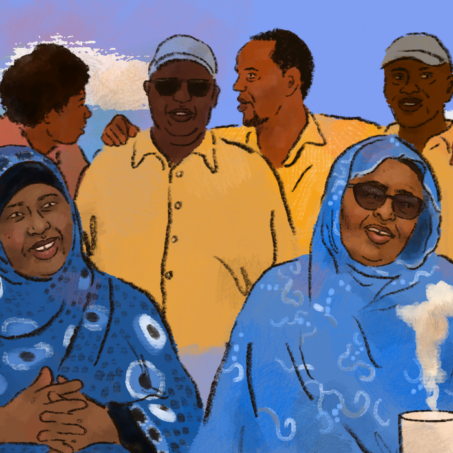Of the many useful concepts we can use to understand our current political atmosphere, two terms are particularly important: the populist hype, which refers to the way mainstream media and political elites have amplified right wing extremism, and reactionary centrism, which refers to centrists who often validate perceived concerns of the right and far right while blaming the left for the failures of centrist politics.
Without them, I believe that our understanding of the so-called ‘rise’ of the far right in the UK is deeply impoverished. The current coverage in mainstream media and subsequent discourse is mostly unable (or unwilling) to view the far right as a threat that can be overcome, (relatively) easily as well.
These two concepts not only help us see how deeply racist, misogynistic and transphobic ideas have been mainstreamed, but they also allow us to also understand who is at fault.
The media is not neutral
Anyone who has paid attention to how the British media platforms the far right will recognise the effects of the populist hype: the media paints itself as neutral when in fact it has “agenda-setting power.”
What this looks like in practice is a deflection from its own role in shaping the discourse. This is paired with a downplaying of racist ideas, and platforming of racist figures, which further muddies the meaning of populism, a political approach that claims to represent ‘the people’, and which could be either right wing or left wing.
Finally, as mentioned, the media platforms right wing and far right actors far more than they do left wing ones, disproportionately to their actual support numbers.
Two striking statistics come to mind.
The first is how the British media decided to obsess over trans people. This is very clear. Between 2012 and 2022 alone, trans-related articles went from just 60 to over 7,500. By 2022, there were at least 125 times more articles on trans people than in 2012. This has facilitated the rise of a far right narrative vis-a-vis “gender ideology” which is talked about in civilisational terms: In effect, trans people are being portrayed not as individuals but as the products of an ideology that threatens the dominance of ‘man’ and perceived traditional gender roles.
Fast forward just three years and we see the Daily Mail actively investigate whether any of Tyler Robinson’s neighbours or roommates were trans, which would apparently help explain why he shot the white supremacist and Christian nationalist Charlie Kirk.
No such questions were asked when it was revealed that the Florida State University shooter in April 2025 turned out to be a Trump fanatic and reportedly a former member of Turning Point USA, Kirk’s group. Kirk himself was among the most prominent proponents of the myth that trans people are disproportionately involved in mass shootings in the US when in fact 98% of mass shootings are committed by cis men.
The second pertains to the guests that are chosen to appear on BBC Question Time, one of the country’s most watched shows: the top five most frequent non-politician panelists all write for The Spectator, the right-wing paper whose editors have included Boris Johnson, Iain Macleod, Nigel Lawson and Michael Gove, all Tory MPs.
What this means is that while the politicians can come from the country’s largest political parties, BBC QT relies on a small number of right wing commentators. This is a blatant violation of the BBC’s impartiality rules, which is monitored by the UK’s media regular, Ofcom.
So any observer of UK politics, even a passive one, would be forgiven for believing that the average British voter is conservative, even as the Tories suffered historic losses in last year’s elections. It would be a reasonable conclusion given the disproportionate weight that is given to right wing views and figures in the media, including supposedly ‘neutral’ ones like the BBC.
Using these examples, we can see how the populist hype has operated in the UK. The media’s ruling elites set the agenda: trans people, people seeking asylum, and so on. These are to be focused on, made to seem like trans people and/or people seeking asylum (and/or enter group to scapegoat) are the single most urgent topic in British politics.
At the same time, those setting the agenda shield themselves from any accountability. Instead, they paint their coverage as merely responding to popular concerns across the UK. This is made all the more convenient when the primary talking heads invited to voice their opinions or write their op-eds are more than happy to go along with the scapegoating.
The result is a media ecosystem that allows for very few nuances, and which incentivises moving further and further to the right.
Reactionary centrism and Labour’s self-destruction
This is at the media level though. What explains the incredibly self-defeating politics of the Labour party under Keir Starmer? That’s where the term “reactionary centrists” comes in handy.
Originally used in an American context, it explains the thinking behind Morgan McSweeney, Starmer’s aid “most associated with the government’s political strategy” as well as other senior figures of the Labour party such as Angela Rayner, Yvette Cooper, Wes Streeting, and so on.
Reactionary centrists describe those who are convinced that the way to do politics is to effectively treat the far right as ‘the people’, the default, the silent majority. They don’t view themselves as right wingers, but act as though right wing politics are always more popular with ‘the people.’
This is very gendered, which I suspect won’t surprise shado readers, as ‘the people’ here are imagined to be all cis-straight males. And white, naturally.

Join our mailing list
Sign up for shado's picks of the week! Dropping in your inbox every Friday, we share news from inside shado + out, plus job listings, event recommendations and actions ✊
Sign up for shado's picks of the week! Dropping in your inbox every Friday, we share news from inside shado + out, plus job listings, event recommendations and actions ✊
This is why we’ve seen politicians such as the aforementioned ones commit themselves to deeply unpopular policies, including and especially among their own base. It’s a most bizarre state of affairs, if we really think about it.
The US Democrats, who are not in power, are more or less committed, at least rhetorically, to opposing Trump. Labour, on the other hand, is in power and yet acts as if Farage is the Prime Minister.
Labour got a solid majority when they ran on the not-Tories platform. It should be therefore obvious that replicating Tory policies is not the way forward. Instead, Labour have even surpassed the Tories in some of their right wing policies, such as the decision to proscribe Palestine Action as a terrorist organisation and arrest hundreds of peaceful protesters, including a disproportionate number of elders, who oppose this decision.
The obsession with both trans people and people seeking asylum was certainly there under the Tories – who can forget Theresa May’s ‘hostile environment’ policy? – but every day it seems that Labour is committing itself to proving the imagined Reform voter that they, Labour, can out-Farage Farage.
This is because, as Toby Buckle has pointed out in a piece for Prospect magazine, reactionary centrists tend to view the far right as “without agency.” This means that the far right is painted as some kind of natural force, as if it is only natural to expect a surge in right wing extremism due to “the excesses of social justice, incivility from the left or cultural disrespect.”
Just think of how the words ‘woke’ and ‘DEI’ became political buzzwords seemingly overnight. Did millions of people suddenly woke up (pun intended) one day and decide that the main problem affecting their lives is all those trans people playing sports and/or all those non-white people keeping the NHS alive?
Hope in public opinion
Could it be possible that opinion on immigration, as with trans issues, has more to do with media coverage than actual immigration levels?
The answer is yes, obviously. Here’s the good news though: despite said media coverage, between 2012 and 2022, 60% of Brits went from seeing immigrants as “taking away jobs” to 60% of Brits viewing immigrants as being vital to economic recovery. Increased negative coverage does not necessarily mean that most Brits develop anti-immigration politics, but it does make immigration a priority issue when it just would not be in different circumstances.
This is something that Labour in particular has been terrible at understanding. Following the logic of reactionary centrists, it would be reasonable to conclude that what Labour needs to do is to be the ‘tough on’ [enter issue or group of people] party.
Labour has adopted extremist right wing policies as a result. Far right actors have threatened to kill asylum seekers stuck in hotels by burning them alive. But Labour did not denounce them as racists and fascists, or implement progressive policies that could give rights to those seeking asylum (such as the right to work, which they currently do not have).
Labour instead decided to prevent already extremely vulnerable asylum seekers from being able to at least be reunited with their families. Labour has done everything in its power to implement Farage-like policies without Farage needing to lift a finger.
Predictably, what has instead happened is Labour haemorrhaging support. Its own MPs have repeatedly voiced their discomfort with many policies, many have openly rebelled, and an increasing number of them are simply defecting. Meanwhile, Labour voters are also defecting to other parties. Contrary to what McSweeney remains convinced by, they are largely defecting to parties such as the Liberal Democrats and the Greens, both of whom are now perceived to be to the Left of Labour (which is quite something with regards to the Lib Dems).
The Greens have also recently voted in Zack Polanski, their most overtly left wing candidate, as their leader with an overwhelming majority. Polanski who, it should be said, campaigned on anti-billionaires and pro-asylum seekers platform (among other policies).
This isn’t including the so-called ‘Your Party’, which does not even have a name yet and yet already has more registered interest (over 500,000) than there are Labour members (some 309,000). We don’t yet know how many of those 500,000 will sign up as paying members, which is ultimately what will matter, but the figure alone is a staggering one for an overtly socialist party given that it was reached in less than a week.
What the media ignores
Were media outlets in the business of reporting trends accurately by analysing the data we have, we would be seeing back-to-back coverage of a rise in left wing politics in the UK in response to Labour’s right wing shift. Instead, as we’ve seen, any passive observer would reasonably conclude that the far right isn’t just on the rise, but that this rise is greater than the turn towards more progressive politics.
And so, thanks to the combination of decades of populist hype and the more recent rise of reactionary centrists in both the US and the UK, combined with the timing of the Charlie Kirk assassination, we saw last weekend the biggest far right march in a very long time, with some 110,000 people estimated to have gathered in London under the slogan ‘united the kingdom’.
Putting aside the painfully obvious dominance of English flags and chants of ‘England,’ which is famously not the United Kingdom, this largest of far right marches was still barely half the numbers of various pro-Palestine rallies, 1/5th of the numbers of the anti-Brexit march, and 1/15th of the numbers of London Pride.
This isn’t to say that the far right is not a genuine threat. As an Arab immigrant in the UK, I promise you that I know that. That is precisely why it is important to not over-estimate their power either as we end up serving as their propaganda ministry when we should be their living nightmare.
We must remember our own strengths, and this includes recognising that while there is a trend in far right and fascist views being normalised, this is not the only trend.
Today, 14% of men aged 18-24 would vote Reform. That’s not good, but why should we ignore the fact that 18% of the same demographic would vote Green? It’s even more obvious with women of the same age group: only 7% would vote for Reform, while 34% for the Greens. That’s even higher than those who would vote for Labour again (30%).
Where then have we gotten the discourse of far right politics being dominant among the youth? The same polling show 38% and 32% of men and women between 50-64 as well as 40% and 32% of above 65s for Reform. The problem seems to be coming from those of a certain age, which just happens to be the same demographic of most MPs and senior editors.
Identifying the real threats
What concepts like the populist hype and reactionary centrism allow us to do is distinguish between real and perceived political trends.
The rise of the far right is very real, but it is often exaggerated. This does not mean that our responses ought to be any less immediate. In fact, I’d argue that making that distinction allows us to more accurately target our responses.
Believing the far right’s own projections of inevitability does not motivate anti-fascist and anti-authoritarian responses. On the contrary, it tends to contribute to a general sense of hopelessness and resignation. We end up wasting a lot of energy that we could be instead using to organise and stop them, and spend more time responding to their latest shock and awe tactics instead of co-building a world where such tactics are rendered irrelevant.
The rise of the far right is the result of concrete forces. There is an observable cause and effect that we can name and trace. This means that rather than view them as part of some grand movement of History (with a capital H), we can instead recognise far right actors as individuals with discernable agendas who respond to national and international events like we do.
The tragedy of both populist hype and reactionary centrism is that they end up boosting that which they claim to oppose. Those who engage in the populist hype end up platforming its most right wing variety, and reactionary centrists facilitate the rise of the far right. By being able to identify these trends we can better hold the relevant media outlets and politicians accountable while working to build alternatives that would eventually, one would hope, render reactionary ideologies irrelevant.
What can you do?
- Find out more about a burgeoning Movement Media Alliance, aiming to build collective power in radical left wing media – email info@shado-mag.com for more information
- Listen to The Fire These Times episodes with Aurelien Mondon, one of the academics exploring the populist hype. Just look up “The Fire These Times” in your podcast app of choice, and write ‘Mondon’
- Get to know your neighbours. This is an evergreen piece of advice, but it is particularly important in helping us get a sense of our environment. It helps with building a community, the lack of which has always facilitated the rise of reactionary movements.
- Read What is the Hostile Environment? by Leah Cowan
- Read more pieces by Elia HERE













